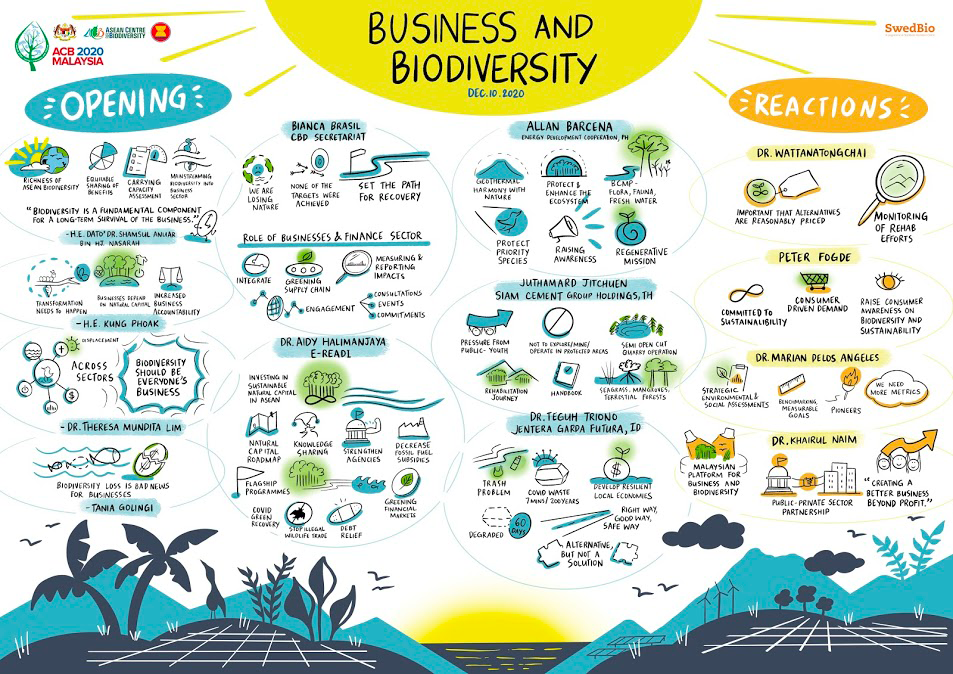
MANILA, 10 December 2020 The ASEAN Centre for Biodiversity (ACB) and the Ministry of Energy and Natural Resources of Malaysia held the fourth and last virtual session of the Third ASEAN Conference on Biodiversity (ACB 2020).
The loss of biodiversity and its dire economic consequences prompt the private sector to urgently consider nature into their business practices and models. Over a hundred representatives from the government, enterprises, academia, and non-government agencies participated in the event which took place on Zoom and livestreamed via Facebook.
In his remarks, Malaysia s Minister of Energy and Natural Resources Dato Shamsul Anuar bin Hj Nasarah said that ensuring projects minimal impacts on existing ecosystems require carrying capacity assessment on biodiversity-based business ventures.
If in the past, most businesses had contributed to environmental degradation, today, let us shift our horizons to support our environment through sustainable and environmentally friendly businesses, the Malaysian minister said. He also urged the business community in the ASEAN region to support biodiversity conservation efforts and ensure fair and equitable sharing of its benefits.
ACB Executive Director Theresa Mundita Lim underscored the dependence of businesses on biological resources for raw materials, stressing that the sustainable use and management of resources, including investing in conservation projects and programmes, make good long-term business sense.
The business sector is an important ally. Mainstreaming biodiversity not only into the strategies and programmes but in the way businesses operate and utilise natural capital, can help reduce and prevent severe impacts on the environment and on the people, she said.
On his part, Deputy Secretary-General for ASEAN Socio-Cultural Community Kung Phoak called for increased business accountability for nature and encouraged all stakeholders of conservation to connect more businesses with the post-2020 global biodiversity framework; reconfigure the business roles and responsibilities; as well as their investment to reverse the biodiversity loss and future risks in the region.
The unprecedented rate at which nature is destroyed puts economies at risk. Approximately US$ 44 trillion, or more than half of the world s combined gross domestic product is dependent on ecosystem services, said Bianca Brasil, Programme Manager of the Convention of Biological Diversity (CBD) citing data from the World Economic Forum.
Representatives from the business sector shared their best practices and business models that put premium on biodiversity and nature.
Allan Barcena, Assistant Vice President and Head of Corporate Social Responsibility and Public Relations of the Philippines Energy Development Corporation, said biodiversity conservation is not just part of their corporate social responsibility, but it is also strategic to the corporation s business operations.
Juthamard Jitchuen, Consultant of Thailand s Siam Cement Group Holdings (SCG), said the company practices biodiversity mitigation hierarchy, which limits projects impacts on biodiversity.
Dr. Teguh Triono, Chairman of the Board of Indonesia s Jentera Garda Futura (JGF) shared how community-based innovation can positively contribute to environmental protection. A start-up microbusiness in South Sumatra in Indonesia, JGF incorporates design, technology, social, and environmental aspects by producing biodegradable food containers made of betel nut leaves, which are previously considered an agricultural waste.
Dr. Khairul Naim Adham, Undersecretary of the Biodiversity Management Division, Ministry of Energy and Natural Resources Malaysia said during his intervention that business should go beyond profit. Malaysia, in its various initiatives, supports the Malaysian Platform for Business and Biodiversity for a stronger collaboration between private sectors at the national and global levels.
The two-hour webinar was moderated by Tania Golingi, Head of the Ecology and Environment Department at DHI Water & Environment Malaysia. It can be accessed at https://bit.ly/3oFbY1M. An announcement about the physical ACB 2020 in 2021 will be made in due course.






